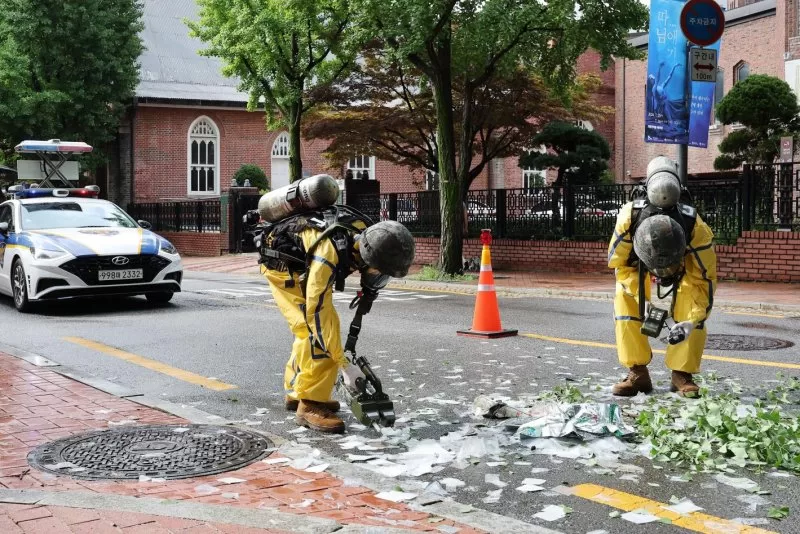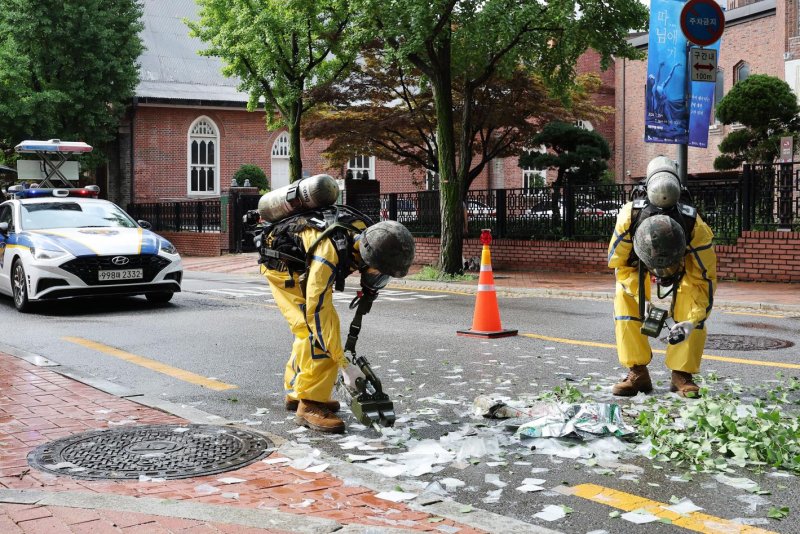1 of 2 | North Korea sent a new round of trash-carrying balloons across the border Wednesday, some of which spilled their contents on the South Korean presidential compound. Soldiers cleaned up trash in downtown Seoul as the military warned citizens to steer clear of the balloons. Photo by Yonhap
SEOUL, July 24 (UPI) — Trash carried by a North Korean balloon landed in the compound of South Korean President Yoon Suk Yeol Wednesday, officials said, as cross-border provocations continue to escalate.
The trash that landed near the president’s office in central Seoul did not contain any chemical, biological or radioactive materials, the Presidential Security Service said in a statement.
“It was confirmed that the object was not dangerous or contaminated, so it was collected and we are continuing to monitor it in cooperation with the Joint Chiefs of Staff,” the statement said.
Earlier Wednesday, the Joint Chiefs of Staff said in a message to reporters that North Korea had launched its latest round of trash-carrying balloons and warned that citizens should be cautious about falling cargo.
Since early June, Pyongyang has sent more than 3,000 balloons carrying scrap paper, manure and discarded clothes into the South, including 500 balloons on Sunday. South Korean officials said that parasites such as roundworms and threadworms, believed to have originated in human excrement, were detected in some balloons’ payloads.
In response, Seoul resumed propaganda loudspeaker broadcasts in the demilitarized zone last week, blasting K-pop songs and South Korean news and information across the border.
The military expanded the round-the-clock transmissions to “all fronts” along the DMZ and will begin incorporating mobile loudspeakers, the Joint Chiefs of Staff said Monday.
“The loudspeaker broadcasts to North Korea will not have an effect just because they have been carried out once, but that they will gradually become effective if the broadcasts are listened to continuously,” JCS spokesman Col. Lee Sung-joon said at a press briefing. “Therefore, if our broadcasting to North Korea continues, we believe that it will have an effect.”
The broadcasts are a form of psychological warfare that has been employed by both sides dating back to the Cold War. Before briefly resuming for one day last month, the South had not used the loudspeakers in six years. However, back-and-forth provocations have mounted in recent months after both Pyongyang and Seoul withdrew from a 2018 military agreement meant to reduce tensions in border areas.
The North claims its launches are in response to the longstanding practice of defector groups floating balloons with anti-Pyongyang leaflets and USB drives over the border.
North Korea has reacted with fury in the past to the balloons. In June 2020, Pyongyang severed all communications with Seoul and blew up an inter-Korean liaison office over what it called South Korea’s failure to rein in the defectors.
Last week, Kim Yo Jong, the sister of North Korean leader Kim Jong Un, threatened “gruesome” consequences if the launches did not end.
North Korea has also been ramping up activity in frontline areas of the DMZ, with soldiers clearing land, erecting barriers and planting tens of thousands of landmines. South Korean defense officials last week warned of the possibility of mines being swept into the South due to heavy rainfalls or dam releases by the North.

